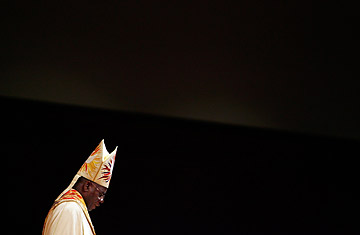
Anglican Archbishop Peter Akinola of Nigeria
The schism long forecast for the Anglican Communion over the church's liberal stand on homosexuality may be getting closer. A document released by a group of conservative churchmen called the Global Anglican Future Conference (GAFcon) made it clear that the more than 250 bishops who belong to the group intend to transform the 77-million-member global Communion, the world's third-largest affiliation of churches, because of their differences over the church's stance on gay priests and other issues.
Just days before the group's conference is set to begin in Jerusalem, GAFcon's leader, Anglican Archbishop Peter Akinola of Nigeria, declared in a 94-page theological statement: "There is no longer any hope, therefore, for a unified Communion ... Now we confront a moment of decision ... We want unity, but not at the cost of relegating Christ to the position of another wise teacher, who can be obeyed or disobeyed. We earnestly desire the healing of our beloved Communion, but not at the cost of rewriting the Bible to accommodate the latest cultural trend. We have arrived at a crossroads; it is, for us, the moment of truth."
Strong words, and ominous for Rowan Williams, the Archbishop of Canterbury, who next month will convene the Communion's once-a-decade Lambeth Conference. If all the conservatives walk out, they will diminish attendance at the July 20 conference by more than one-quarter. (Liberals assert that the number of abstainers will be much smaller.) The entire process could well result in the diminution of the power of the Archbishop of Canterbury, the titular head of the Communion and the closest thing the denomination has to a Pontiff.
That potential boycott and Akinola's strong language this week will make it much harder for Williams to ignore the fact that a sizable chunk of his Communion, particularly from Africa and conservative dioceses of North America, is no longer interested in discussing questions of how the Communion will deal with homosexual bishops and the blessing of homosexual unions, and appears ready to act unilaterally to get its way. Failure to deal with the conflict could result in a shift in the Communion's center of power away from its English roots and toward its growing, disgruntled churches in the southern hemisphere.
Some observers, however, caution against too much doomsaying. The GAFcon statement, they point out, does not necessarily mean that Communion will break in half in the near future. For one thing, the document expresses the GAFcon bishops' intention to break specifically with churches like the Episcopal church in the U.S. and the Anglican Church of Canada, which make gay bishops or support such decisions — and does not call for secession from the worldwide group. Indeed, the conservatives say they would prefer that the Communion either become a looser confederation than it currently is or be "realigned" along more conservative principles, possibly with a lessening of the influence of the Archbishop of Canterbury. At a news conference, Archbishop Peter Jensen of Sydney, head of the GAFcon program committee, put the blame for any schism on the American and Canadian churches, which he said have "ripped" the Communion. He added, "I don't hear GAFcon saying or GAFcon being a further cause for schism."
What's more, the GAFcon conference itself has been a bit of a Keystone Kops affair. Several key conservative bishops who were slated to appear chose not to travel to the Mideast, leaving open the possibility that they will attend Lambeth instead. The group even had trouble finding a location for its conference. At first it was scheduled for Jerusalem, but then the Anglican bishop there said he had enough problems without a divisive conference on his turf. The site was switched to Jordan, but on Wednesday the Jordanian border authorities delayed Akinola and another bishop from entering the country. The reasons were not stated, but opponents suggest that the Jordanians finally caught up with some of the remarks Akinola made in Nigeria a few years ago that may have contributed to violence between Christians and Muslims.
Jim Naughton, a Canon with the Episcopal diocese of Washington and one of his church's more outspoken liberals, says, "I don't think these guys have the juice to pull off a genuine schism. I don't think Archbishop Akinola speaks for Africa. The coalition he once touted as the 'global south' has shrunk to three hard-line provinces [Nigeria, Rwanda and Uganda] and [some] Western culture warriors."
Observers will be counting very carefully the number of bishops who actually shown up in Jerusalem for the conservative conference on Monday. But even if the group does not manage to force Williams' hand in Lambeth, its statement marks a seemingly irrevocable step toward either a split or a redefined Communion that could have a huge impact on the already turbulent state of Anglican religion in the U.S.
